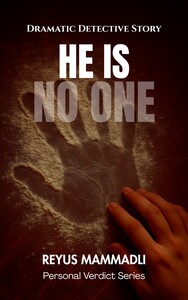
He Is No One
A short novel by Reyus Mammadli
Chapter 1
Elkford, an American village — 1868
Joe Harlow snapped awake.
It had been a dull thud: the front door had slammed. Was he asleep? Joe the miller couldn’t say for sure. He was usually hard to rouse, but this time it had worked. He sat up in bed, trying to get his bearings. Traces of a restless dream lingered in his head, though he couldn’t remember it. So I was asleep, he thought.
His eyes fell on his boots, tossed beside the bed. He didn’t remember leaving them that way. He always took them off by the door, which creaked open again.
He tried to remember whether he’d latched the door. How long has it been slamming in a draft?
Outside, it was already dark. Memory offered no answers and he gave up: with a noisy exhale he got up to properly lock the door.
Then a sound came from the house.
A whisper. Yes — a whisper. From his grown daughter’s room.
He looked toward the window again. Night. Why wasn’t Mary asleep? And, most importantly, who was she talking to?
Joe turned his head, feeling the crunch of his neck vertebrae. His hearing sharpened.
“No, no, I don’t want to…” he made out her words. The voice was plaintive, begging.
He got up quickly and went to her door, which was closed tight but hung a little crooked; darkness showed through the gap.
His steps were heard, the floorboards creaking. Then silence fell.
“Mary…” he listened for sounds from her room. There was no answer. He broke the silence himself: “You all right?”
Waiting a moment more, he warned, “I’m coming in, sweetheart.”
Mary was almost sixteen, and he wouldn’t normally go into her room at night without asking. This time she didn’t answer. He pulled the door toward him and stepped inside her room.
She sat on the bed, looking at him with wide, frightened eyes.
“What’s the matter, girl?”
She straightened and asked quietly,
“You’re home already?”
“I slept in the front room.”
Mary pointed with a trembling hand at the closed window and, uncertainly, almost stammering, said,
“Pa, you — you were talking to me just now.”
Joe was fully awake now. His daughter’s fear began to spread to him.
“What are you saying, Mary? Did you have a nightmare?”
She shook her head, not taking her eyes off him.
“No, Papa. I wasn’t asleep.” She swallowed and pointed at the window again, as if calling him to witness: “You knocked on the window, and I opened it.”
“That’s nonsense, child,” Joe said, stern but trying not to frighten her. He didn’t remember being like that. He tried to figure out what had happened, but couldn’t.
She looked toward the window and continued,
“You put it on the sill and told me to wash it. And then… then… Papa, why…”
Joe stepped confidently to the window. On the sill, in the weak moonlight, lay a knife. He didn’t recognize it at first because of the dried blood smeared along the blade. Still, he realized it was his knife. Heat surged into his face from the sight of the blood; he felt his scalp tighten.
He turned slowly back to Mary. She sat there blinking rapidly. It all seemed absurd, but seeing the girl’s terror, he wanted to hear her out no matter how strange her story sounded. Trying to calm both himself and her, he asked quietly, almost matter-of-factly,
“You said ‘then,’ Mary. What did I do then?”
She felt for a pillow, drew it close, and hugged it tight as if seeking protection.
“You said you’d kill me in seven days, too.”
The hours before it happened.
Former deputy sheriff Horace Briggs spent most of his days alone. His son Thomas, who worked with the head miller, left for work before dawn.
At first, habit won out: Horace still woke early, just as he had all his years in service. But last winter he’d taken sick, laid up nearly two weeks. Since then, his body had changed—now, even if he woke, he’d turn over and drift back into sleep.
The second waking was always the real one. Get up, eat breakfast. Today it was marked by a knock at the door.
“Sheriff!” A man’s voice outside. Sharp, hurried. “Sheriff, are you home?”
“Just like the old days,” Horace muttered, rising. Already stepping toward the door, he called out: “Stop calling me Sheriff. Just Mister Briggs.”
He opened the door. On the threshold stood a young man, breathless, as if he’d run all the way without stopping. Worn work clothes, mud, the smell of the farm. Tall, lanky, his arms too long, almost out of proportion.
“Good morning, Sheriff,” the young man panted.
“Robert? Owen’s boy?” Horace asked.
The boy nodded. A flicker of relief in his eyes—he’d been recognized. Briggs studied him closely, noticed the crooked teeth. His tone hardened:
“I said: just Mister Briggs.”
Robert nodded again, crisp, almost like a soldier.
“Yes, Sheriff.”
A disappointed sigh.
“Well? What brought you here?”
The boy straightened his shoulders as if about to give a report.
“Anna. The late Mister James’s daughter… She’s been murdered.”
Briggs dropped his gaze. It seemed as though he was staring at the boy’s boots. In truth, he was working over the words. Everyone in the village knew who he had been. They’d been proud of him. And now, with a murder, they’d come to him first.
The thought of his son cut sharp. Just a week ago, Thomas had spoken with excitement about Anna—graceful, kind… This would hit him hard.
“How was she killed?”
“With a knife, sir.” The answer was quick, rehearsed. “In the woods.”
Briggs nodded. Turned toward the house.
“Give me a minute. I’ll get ready. You’ll take me there.”
Faces of knife-slain girls flashed in memory. His years of service had left them inside him for good. He’d long understood: the victims stay with those who investigate. That was the price. And now—another.
The boy hesitated. Then said, staring at Briggs’s back:
“Uh… will you take your revolver?”
Briggs turned slowly. Looked over his shoulder. Heavy.
“And why would I need it?”
Robert flushed with unease. As if he’d spoken out of turn.
“I don’t know…”
“No, I won’t,” Briggs snapped, irritation in his voice. “I don’t intend to kill anyone.”
Someone had given the order not to touch the girl’s body until the Sheriff arrived. To the village, Briggs was more than a man—he was a symbol: pride and law, both in town and here.
He walked slowly, Robert leading the way. The boy kept quiet most of the time, but now and then broke into questions. Foolish, distracting ones. Briggs held back his irritation—he knew Robert wasn’t as simple as he seemed. Observant. And in cases like these, any eye could prove useful.
Neighbors greeted him, pointed the way. Briggs nodded and kept walking.
Soon the wailing of women reached him. Murder always enters with a cry. Surely Anna’s mother.
The girl, dressed in a plain summer outfit, lay flat on her back, motionless. Margaret Clark knelt beside her daughter. She raised her eyes to Briggs—red, swollen from tears. She clutched Anna’s fingers, lifted the hand slightly from the ground.
“Look, Sheriff, what they’ve done to my girl.” Her voice trembled, but her gaze was sharp, demanding. “Who was it? Who could do this?”
Briggs understood: the question wasn’t really for him but for the emptiness, a place to pour out grief. He lowered his eyes.
“I don’t know, Mrs. Clark. But I’ll try to find out.”
She turned away without reply. Pressed the cold palm to her cheek and wept again, softly.
Briggs glanced around, hoping someone would step in to care for the woman. He needed to examine the scene, but the mother shielded the body with her own.
“Her face…” she murmured. “My beautiful child…”
The old investigator stepped closer. A neighbor finally approached Margaret, bent down, whispered something. She wavered, then let go of her daughter’s hand and rose with her friend’s support.
Now he could look at the body.
Briggs saw at once: no wound in front. But blood had flowed from her right side. He turned his gaze on Robert—the boy stood frozen. In a dry, steady voice, Briggs asked:
“How do you know she was murdered with a knife?”
The boy flinched, as if touched by heat.
“I… I…” He shook his head.
“I told him,” came another voice. Thomas stepped out from the crowd.
Briggs automatically scanned the faces gathered, as if counting them. Then gave his son a nod: go on.
“I lifted her,” Thomas said. “I saw the wound. I wanted to help.”
Briggs lowered his head briefly. Accepted.
He circled the body and dropped to one knee, his joints aching. He ignored the pain—his constable’s eyes were at work: blood traces stretched a few feet from the spot.
Carefully, he turned the girl onto her side. The torn blouse at her flank spoke for itself: there had been a single blow.
He slipped his fingers into the tear in the fabric and felt the wound. Fairly large. The blade had been broad—about two finger joints wide.
He eased the body back onto her spine and wiped his fingers on a clean edge of her dress. People frowned, but he was used to that. There was no other way.
Then Briggs leaned closer. With two fingers he gently lifted Anna’s lower lip, then the upper. His fingertips brushed the cold skin. Inside, in the dark of her mouth, gaped emptiness—her front teeth knocked out.
The crowd stirred. Someone sucked in air sharply. A murmur spread: you shouldn’t treat a body that way. Too rough, too merciless.
But Briggs didn’t listen. He saw only the pale, lifeless face and the signs of violence.
Thomas crouched beside him.
“She was beaten,” he said, voice unsteady.
Horace looked at his son. The boy pressed his lips together, as though tasting someone else’s pain. A week ago, he had said, She has the most wonderful smile, Papa. Now the smile was gone.
“Yes, beaten badly,” Briggs said quietly. A pause. “But afterward. She was already dead by then.”
